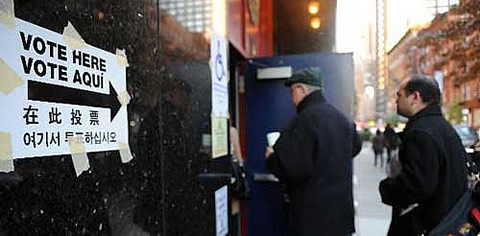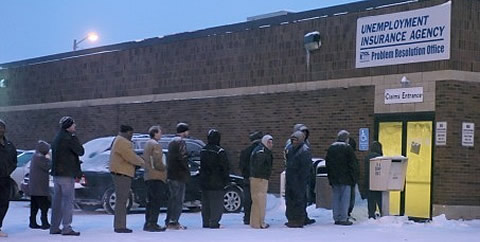Posted November 3, 2010
NOVEMBER 3, THE DAY AFTER — Several points stand out from the long-predicted results of the midterm election. The Democrats, of course, took a big hammering — and quite frankly, they deserved it. If it weren’t for the gift of a few whacked-out Tea Party candidates in critical races, they’d have lost the Senate too.

A line of voters file into New York City polling station
As the editorial in the new issue of Against the Current states, this election does not mark a massive popular “move to the right,” nor did the Democrats’ victory in 2008 mean a big “swing to the left.” Barack Obama and the Democrats won big in 2008 because of the disasters of the George W. Bush regime; they lost in 2010 because they failed to accomplish a healthy economic recovery, and because their capitulation to conservative obstruction demoralized their own base.
Underneath the short-term electoral swings lies a deeper reality: U.S. capitalism is up the crisis creek without a policy paddle. A week before the election, Martin Wolf of the Financial Times put it this way:
“A large part of the American public has long since forgotten the gravity of the financial heart attack that hit the US in the autumn of 2008. The Republicans have convinced many voters that the intervention by the Democrats, not the catastrophe George W. Bush bequeathed, explains the malaise…
“Does President Obama deserve blame for this outcome? No and yes. No, because his treatment was right, in principle; yes, because it was too cautious, in practice…The president’s willingness to ask for too little [economic stimulus] was, it turns out, a huge strategic error.”
Wolf concludes: “With a political stalemate expected, further action will now be blocked. A lost decade seems quite likely. That would be a calamity for the US – and for the world.” (“Why the voters are suing Dr. Obama,” FT, October 27, 2010)
The term “lost decade” in economic parlance derives from the experience of Japan following the late 1980s Asian crisis, when the Japanese economy fell into deep longterm stagnation. The fear today is that the U.S. economic “recovery” will be unable to create jobs even at the rate of population increase, let alone restore the massive job losses of the Great Recession.
If this scenario proves to be accurate, politics in the United States will be subject to volatile mood swings as people look for solutions in all kinds of directions – especially in an era where the basic institutions of the working class, the unions, are weaker than at any time since the mid-1920s, and when unregulated and unreported mystery money can now pour into political campaigns.

A line of jobless workers at a Michigan unemployment office
In the new power configuration, any form of enhanced economic stimulus – except possibly further tax cuts for the rich – is out of the question. The Democrats didn’t fight for an adequate stimulus when they had the power, and now they’ve lost the power. At the same time, underneath the hysterical Tea Party rhetoric of “balanced budget now,” the Republican alternative to “tax and spend” is “just spend” – especially on the military.
Will that change now? Not likely. As the conservative essayist David Frum points out, the major plank of the Tea Party program – repeal of the health care bill – would wipe out the Medicare savings of the Obama plan, adding hundreds of billions to the longterm deficit.
In any case, the Republicans don’t have the votes to repeal the bill outright. They do have the capacity to deny funding for implementing many of its key provisions, so that the result will quite likely be an even more chaotic health care mess than before.
The Republican right wing/Tea Party faction will be screaming for the abolition or outright privatization of Social Security. This, of course, won’t be happening in such naked and blatant form. Rather, President Obama will be convening a bipartisan commission on “entitlement reform” so that the slashing of benefits and the dispossession of future generations’ pension rights has a sober and responsible look.
For the Democratic voting base, of course, any hope of progressive legislation in the remainder of Obama’s first term is over. The Employee Free Choice Act for working people, the DREAM Act for young undocumented immigrants, the repeal of Don’t Ask Don’t Tell, action on catastrophic climate change, the closing of Guantanamo and the rescinding of Bush-era attacks on civil liberties, are lost causes for now. The Obama administration, which was never friendly to the left, will no longer feel pressure from the liberal wing of the Democratic party, least of all in Congress.
The heaviest attacks from the right wing will fall on the most vulnerable, especially immigrant and Muslim communities in states where legislatures are preparing racial-profiling laws patterned on Arizona’s infamous SB1070. That’s where the importance of independent mobilizations to defend basic democratic rights will be most critical.
One of Barack Obama’s biggest assets, in the eyes of capital, was his enormous global prestige. That has now been seriously weakened. There will certainly be no positive changes in U.S. Middle East policy, whether in Palestine or in the deadly grind of the war in Afghanistan-Pakistan. In fact, we can anticipate bipartisan Congressional agreement on supporting in practice Israel’s drive for a consolidated colonial-apartheid system – but all this should be the subject of a separate discussion in its own right.
Does all this imply that prospects for leftwing activism are hopeless? Not at all, but it does mean that the prospects for positive change lie outside the two parties, center-right and hard-right, of corporate capital. And there are hopeful signs: Howie Hawkins, the Green candidate for New York Governor, came in third in a field of seven candidates, polling more than the 50,000 votes needed to re-establish the Greens as a ballot-status party for the next four years in NY State. Congratulations to Howie and to all of the Greens who worked to make this possible!
The Dan La Botz campaign for U.S. Senate on the Socialist Party ticket in Ohio was another example of how genuine alternative solutions to the crisis can be presented to working people whose lives are most brutally affected by the crisis. Dan received more than 25,000 votes and received support from members of several socialist organizations.
The next political period is a very difficult one – not because the U.S. population has moved right, but because the most reactionary and well-financed forces have seized control of the agenda. As it becomes clear that the fly-by-night “solutions” of the Tea Party are no solutions at all, the question will be whether the movements for the change that the Democrats couldn’t and wouldn’t deliver have the strength and credibility to change the prevailing agenda.
— David Finkel, for the Political Committee of Solidarity
